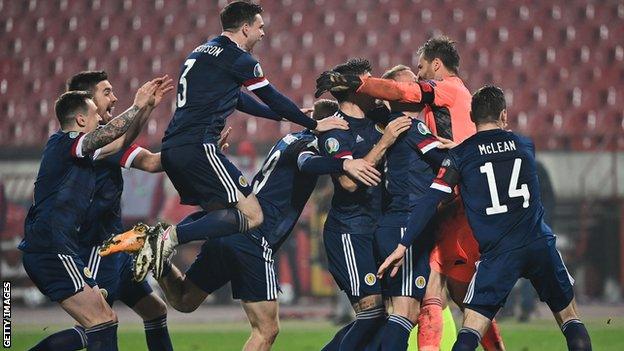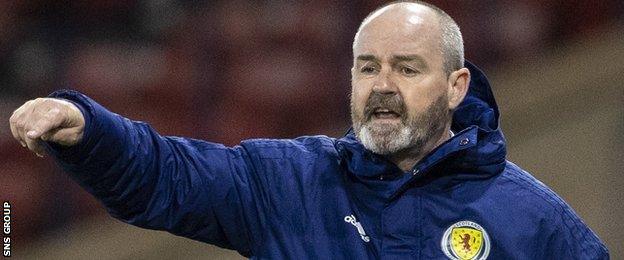Euro 2020: 'Scotland are back in the big time as fans revel in glorious frenzy'
- Published

The moment Scotland qualified for Euro 2020... David Marshall is mobbed by delighted team-mates after his decisive penalty save in Belgrade
Without wanting to go all Al Pacino on this, the Hollywood behemoth got it right in his famous speech in the movie Any Given Sunday - football is a game of inches right enough.
It might be not good for the soul to dwell on this for very long, but what if John McGinn's opening penalty in the shootout against Israel had been stopped rather than squirming obligingly under the body of Ofir Marciano? What if David Marshall had dived left instead of right when up against Eran Zahavi in the same game? What if Marshall had dived right instead of left when up against Aleksandar Mitrovic of Serbia?
Those knife-edge moments went Scotland's way and we are now in the midst of the biggest national football party in 23 years on the back of it. All corners of the country and all ages in the spectrum are engaged.
After so much muck, the beautiful game is, at last, beautiful again to Scotland.
Because of tiny margins we are spared the post-mortem.
No waffle about genetics, no self-flagellation about the weather and video games and facilities conspiring against the production of good young players, no think tanks and blueprints and visits to the Netherlands and Norway and Iceland to figure out how they did it and what lessons Scotland could learn from them. No maudlin revisiting of the days when players from this country dominated British football. Instead, liberation.
Five European Championships and five World Cups have come and gone since Scotland's men last had a seat at football's top table. Ten tournaments across 23 years.
Sixty-seven countries have played in one of these things since this nation last graced the big stage. Sixty-seven countries with a combined population of 4.1 billion. That's a lot of kids in a lot of places who know what it feels like to see their heroes play among the elite.
It's different here, of course. The youth of Scotland are only now learning about the glorious frenzy of following the national team to the big time, the tidal wave of excitement that floods every corner of the land when things come good.
It's immensely powerful no matter where in the world it happens but it's especially strong in this country where the love of the game is so all-consuming for so many.
Older Scotland fans dined heartily on routine qualification for World Cups. The generations that followed have had to make to do with morsels. They've been reared on Tartan Army stories from before they were born while living through failure in the present, humiliating defeats and fatalism.
The probability is that many of them tuned out a long time ago. Crowds at Hampden dwindled. The relevance of the national team reached an all-time low somewhere along the line. Hope had left town.
Sitting in a radio studio with Chick Young in the wake of one such abomination - possibly Kazakhstan, but the list of failures is a long one - the image of the veteran broadcaster is easy to recall.
Chick may as well have been dressed in black that night. His mood couldn't have been any more sombre had a violinist been playing a lament into his ear.
"I've come to accept that I will never see my country play in a major tournament again in my lifetime," he said. The utter hopelessness of it was striking, not least because Chick probably captured the mood of many, many Scots.
'Come on, we can do it' - Supporting Scotland
There's been a rebirth, though. Nobody knows where this is headed over the next few weeks but the fact that Scotland have made it to the Euros has brought feelgood to the national team.
Those penalty shootouts, Marshall's face as he waited for the referee's thumbs-up against Serbia, Ryan Christie's tears. The joy of it eroded decades worth of cynicism, it uncorked feelings that Scotland fans may not have realised they were capable of any more.
There are little snapshots everywhere and there will be more and more illustrations of a changing landscape as the days go by. You know that something profound is happening when the sight of Liam Cooper coming out of a Panini sticker packet elicits a euphoria in a kid that starts somewhere around his toes before travelling through his body and bursting out the top of his head.
It's a scene that takes you back to when you were that kid and you'd just landed a Kenny Dalglish or a Daniel Passarella or a Marco Tardelli or, glory of glories, Socrates.
In my hometown, the Limerick of the 1970s and most of the 1980s, the thought that one of my own could come out of those sticker packets never dawned on me. The Republic of Ireland never qualified for anything. We followed Northern Ireland and Scotland at the big tournaments instead. We never thought a day would dawn when our lads would be out there, but it did and it was magic and the thrill of it is still fresh in the memory.
Never mind Father Time, Jack Charlton and his Ireland team will live forever. Steve Clarke and his Scotland team might achieve the same immortality in the weeks and years ahead. It's a new beginning, a wonderful time for gnarled old codgers who never thought they'd see these days again and for youngsters who may have thought that major championships were for other countries, not theirs.

Steve Clarke has done what previous Scotland managers Berti Vogts, Walter Smith, Alex McLeish, George Burley, Craig Levein and Gordon Strachan could not
How old would you need to be to have a clear memory of when Scotland's men last appeared in a big tournament? This writer's first truly vivid football day was Liverpool's 1977 European Cup victory over Borussia Monchengladbach, Terry McDermott, Tommy Smith, Phil Neal and all that. I'd just turned eight.
I was not the most advanced of children, so let's take seven as our marker instead. That means that most Scots under the age of 30 will probably have little or no recollection of their country at the World Cup in France in 1998.
That's actually quite chilling when you think of the greatness Scotland has delivered to the game, the immortal players and managers and occasions.
Forget the serial qualifiers, the densely populated giants who always get there, and think of the Icelands and the Slovenias and the Slovakias, the Republic of Irelands and the Northern Irelands, the Waleses, the Latvias and the Albanias. They've all had a taste of it since Scotland last had a sniff.
Think beyond Europe to Trinidad and Tobago with a population of around two million. Think of Uruguay and Panama and their four million. Think of New Zealand and Costa Rica with five million. Their youth knows what the buzz is all about. Scotland's youth are only just finding out.
You might know the Poppy Lord story - it's majestic. The 10-year-old from St Stephen's Primary in Dalmuir writes a heartfelt letter to her teacher to ask if they could all watch Scotland's game against the Czech Republic on Monday, kicking off during school time. John McGinn, an old St Stephen's boy, gets involved to support Poppy's campaign. The media embraces the campaign and Poppy wins. Instantly, she's declared a "legend" by her school pals. Marvellous.
Billy Gilmour, Nathan Patterson and David Turnbull have something in common with Poppy and tens of thousands of others in Scotland - none of them were born when the country played in France in 1998. Kieran Tierney, Scott McTominay and Che Adams were one. John McGinn and Ryan Christie were three, Andy Robertson was four.
All they saw growing up was Scotland fail. Occasionally there would be optimism only to be followed quickly by pain and the exit of another manager and the grim search for a new guy willing to take it on.
Clarke's arrival was the turning point. Everybody hoped it would be, but the man has had to soak up all our doubt, all our scepticism, all our cynicism and roll with it. He said he'd get there - and he has.
There is something of the Charlton about Clarke. Direct, solid, not given to extremes of emotion, he exudes authority and respect. He doesn't over-promise or over-complicate, he just gathers his players around him and gets on with it.
He's taken Scotland to this point, a giddy place so elusive for so long. From the funeral march to the Fratellis, from 'Oh No!' to 'Yes Sir!' The Scots, ladies and gentlemen, are back.

It's a mum-eat-mum world: Motherland returns for a third season of playdate politics and PTA terror
You're Dead to Me: Was Lord Byron the most scandalous celebrity of the 19th century?

